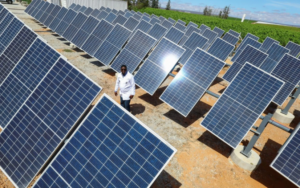|
Getting your Trinity Audio player ready...
|
Imagine a future where Africa’s vast landscapes are not just rich in natural beauty but also abundant sources of clean, sustainable energy. This vision is no longer a distant dream but a rapidly unfolding reality. Africa is in the midst of a renewable energy revolution that is set to transform its energy landscape and power its future. In this blog post, we’ll embark on a journey through the inspiring world of renewable energy initiatives in Africa.

The Urgent Need for Renewable Energy
Africa, a continent pulsating with vibrant life and untapped potential, is facing an energy crossroads. With a burgeoning population, rapid urbanization, and burgeoning industries, the demand for energy is soaring. However, there is a growing awareness of the environmental costs of traditional fossil fuels.
Renewable energy sources, such as solar, wind, and hydropower, offer a beacon of hope. They provide clean, sustainable energy while mitigating the harmful effects of climate change. The transition to renewables is not just about meeting the energy demand; it’s about safeguarding Africa’s natural heritage and securing a brighter, greener future.
Solar Energy: Africa’s Abundant Resource
Africa is blessed with an abundance of sunshine, making solar energy a natural fit for the continent. Solar panels are sprouting across the landscape, capturing the sun’s energy and transforming it into electricity. From vast solar farms in Morocco to rooftop installations in Nigeria, solar power is illuminating African homes and industries.
But solar energy is not just about reducing carbon emissions; it’s about empowerment. Off-grid solar solutions are lighting up remote villages, providing electricity where it was once a distant dream. These initiatives are changing lives, improving education, and catalyzing economic growth.
Wind Energy: Harnessing the Power of the Breezes
In regions blessed with consistent winds, wind turbines are becoming a familiar sight. African nations like Kenya and South Africa are embracing wind energy projects that harness the power of the breezes. Wind farms, often perched in coastal and high-wind regions, are adding a new dimension to Africa’s energy mix.
Wind energy isn’t just about environmental benefits; it’s also an economic driver. As technology advances, wind turbines are becoming more efficient and cost-effective. Beyond reducing carbon footprints, wind energy is creating jobs and attracting investments, propelling Africa towards a sustainable energy future.
Hydropower: Tapping into Rivers’ Potential
Africa’s abundant rivers and water bodies offer a promising source of clean energy through hydropower. Large dams and run-of-river hydropower plants are tapping into this potential, generating electricity to power industries and homes.
However, hydropower projects must be developed with careful consideration of their environmental and social impacts. Sustainable practices, such as fish-friendly turbine designs and habitat preservation, are essential to balance energy needs with conservation efforts.
Biomass and Bioenergy: Harnessing Nature’s Recycling
Biomass energy, derived from organic materials such as agricultural waste and forestry residues, is another arrow in Africa’s renewable energy quiver. Bioenergy facilities convert these materials into heat, electricity, and biofuels, offering a sustainable alternative to fossil fuels.
This approach not only reduces waste and promotes agricultural sustainability but also creates opportunities for rural communities. Small-scale bioenergy initiatives are emerging, providing local jobs and decentralized energy production.
Geothermal Energy: Tapping the Earth’s Heat
Africa is a hotspot for geothermal energy, thanks to its geological activity. Geothermal power plants harness the Earth’s heat from beneath the surface, producing electricity with minimal environmental impact.
Countries like Kenya and Ethiopia are leading the way in geothermal energy development, demonstrating the potential for this renewable source to power industries and reduce reliance on fossil fuels.
Policy and Investment
The success of renewable energy initiatives in Africa hinges on supportive policies and strategic investments. Governments across the continent are enacting incentives, feed-in tariffs, and regulatory frameworks that encourage renewable energy adoption.
Investment in research and development is also crucial, as it leads to technological advancements and cost reductions in renewable energy systems. International partnerships and funding mechanisms play a pivotal role in accelerating Africa’s transition to renewable energy.
Challenges and Solutions
While the potential for renewable energy in Africa is immense, challenges persist. These include financing barriers, infrastructure gaps, and grid integration issues. Overcoming these challenges requires collaborative efforts from governments, the private sector, and civil society.
Innovations in financing models, such as pay-as-you-go solar systems and green bonds, are making renewable energy more accessible to a wider population. Smart grid technologies and energy storage solutions are enhancing grid reliability and enabling the integration of intermittent renewables.
Conclusion
As we conclude our exploration of renewable energy initiatives in Africa, one thing is abundantly clear: the continent’s energy future is bright and sustainable. From the sun-soaked deserts to the breezy coasts and fertile landscapes, Africa is harnessing its natural gifts to power its communities and industries.
The renewable revolution is not just about reducing carbon emissions; it’s about fostering economic growth, improving energy access, and protecting the environment. Africa’s journey towards a sustainable energy future is a testament to innovation, determination, and a shared vision of a greener tomorrow.
You might also be interested in:
- The Importance of Africa’s Independent Strategy
- What Africa Should Do To Solve Its Global Economic Crisis
- Interesting Facts about Africa
- Rich Culture & History of Africa